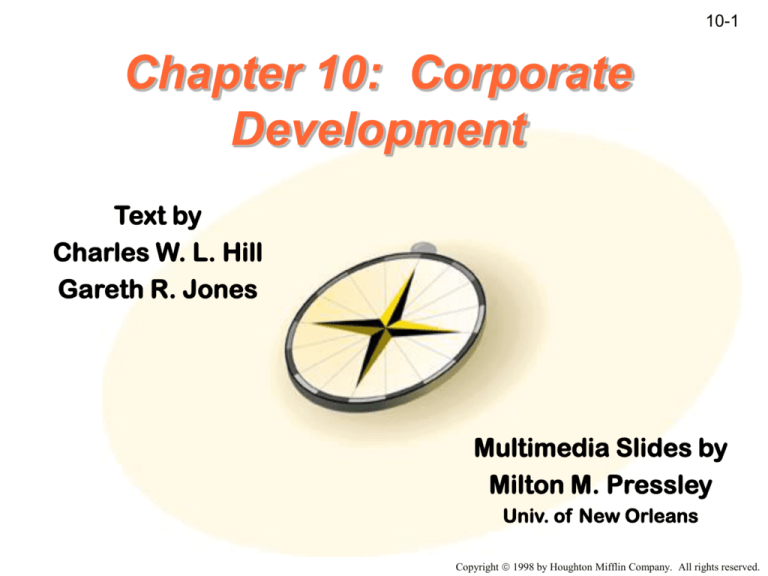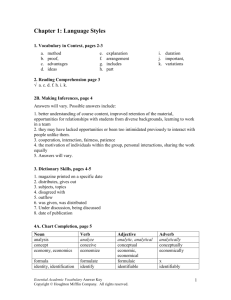
10-1
Chapter 10: Corporate
Development
Text by
Charles W. L. Hill
Gareth R. Jones
Multimedia Slides by
Milton M. Pressley
Univ. of New Orleans
Copyright 1998 by Houghton Mifflin Company. All rights reserved.
10-2
Preview
Reviewing the Corporate Portfolio
Internal New Venturing
Acquisitions as an Entry Strategy
Joint Ventures as an Entry Strategy
Restructuring
Turnaround Strategy
Copyright 1998 by Houghton Mifflin Company. All rights reserved.
10-3
Reviewing the Corporate
Portfolio
• Portfolio Planning
• Identifying SBUs
• Assessing and Comparing SBUs
– Relative Market Share
– Relative Growth Rate
Copyright 1998 by Houghton Mifflin Company. All rights reserved.
10-4
Figure 10.1: The BCG Matrix
Industry Growth Rate
High
Low
High
Perspectives, No. 66, “The Product Portfolio.” Adapted by
permission from the Boston Consulting Group, Inc. 1970
Low
Relative Market Share
Copyright 1998 by Houghton Mifflin Company. All rights reserved.
10-5
Figure 10.1: The BCG Matrix
Stars
Industry Growth Rate
High
Low
High
Perspectives, No. 66, “The Product Portfolio.” Adapted by
permission from the Boston Consulting Group, Inc. 1970
Low
Relative Market Share
Copyright 1998 by Houghton Mifflin Company. All rights reserved.
10-6
Figure 10.1: The BCG Matrix
Stars
Question Marks
??
Industry Growth Rate
High
??
Low
High
Perspectives, No. 66, “The Product Portfolio.” Adapted by
permission from the Boston Consulting Group, Inc. 1970
Low
Relative Market Share
Copyright 1998 by Houghton Mifflin Company. All rights reserved.
10-7
Figure 10.1: The BCG Matrix
Stars
Question Marks
??
Industry Growth Rate
High
Low
??
Cash Cows
High
Perspectives, No. 66, “The Product Portfolio.” Adapted by
permission from the Boston Consulting Group, Inc. 1970
Low
Relative Market Share
Copyright 1998 by Houghton Mifflin Company. All rights reserved.
10-8
Figure 10.1: The BCG Matrix
Stars
Question Marks
??
Industry Growth Rate
High
Low
??
Dogs
Cash Cows
High
Perspectives, No. 66, “The Product Portfolio.” Adapted by
permission from the Boston Consulting Group, Inc. 1970
Low
Relative Market Share
Copyright 1998 by Houghton Mifflin Company. All rights reserved.
10-9
Reviewing the Corporate
Portfolio (Continued)
Strategic Implications
– Cash Surplus from Cash Cows Used
to Support Question Marks and Stars
– Question Marks Divested
– Exit Industry Where SBU is a Dog
– Firm with Insufficient Cash Cows,
Stars, or Question Marks Should
Consider Acquisitions and
Divestments
Copyright 1998 by Houghton Mifflin Company. All rights reserved.
10-10
Reviewing the Corporate
Portfolio (Continued)
Limitations of BCG Matrix
– Simplistic
– Connection Between Relative Market
Share and Cost Savings Not
Straightforward
– High Market Share in a Low-Growth
Industry Does Not Necessarily Create a
Cash Cow
Copyright 1998 by Houghton Mifflin Company. All rights reserved.
Figure 10.2: The McKinsey Matrix
10-11
Industry Attractiveness
Competitive Position
Good
Medium
Poor
High
Winner
Winner
Question
Mark
Medium
Winner
Average
Business
Loser
Profit
Producer
Loser
Loser
Low
Copyright 1998 by Houghton Mifflin Company. All rights reserved.
10-12
Reviewing the Corporate
Portfolio (Continued)
Limitations of BCG Matrix
– Simplistic
– Connection Between Relative Market
Share and Cost Savings Not
Straightforward
– High Market Share in a Low-Growth
Industry Does Not Necessarily Create a
Cash Cow
– Fails to Pay Attention to the Source of
Value Creation from Diversification
Copyright 1998 by Houghton Mifflin Company. All rights reserved.
10-13
Reviewing the Corporate
Portfolio (Continued)
• The Corporation as a Portfolio
of Core Competencies
– Core Competence
– Matrix Approach
Copyright 1998 by Houghton Mifflin Company. All rights reserved.
Figure 10.3: Establishing a Core
Competence Agenda
Premiere Plus 10
What new core
competencies will we
need to build to
New
protect and extend
our franchise in
CORE
current markets?
COMPETENCE
Fill in the Blanks
What is the
opportunity to
Existing improve our position
in existing markets
by better leveraging
our existing core
competencies?
Reprinted by permission of Harvard Business School
Press. From COMPETING FOR THE FUTURE: BREAKTHROUGH STRATEGIES FOR SEIZING CONTROL
OF YOUR INDUSTRY AND CREATING THE MARKETS
OF TOMORROW by Gary Hamel and C. K. Prahalad, Boston, MA.
Copyright by Gary Hamel and C. K. Prahalad. All Rights Reserved.
10-14
Megs Opportunities
What new core
competencies would
we need to build to
participate in the most
exciting markets of
the future?
White Spaces
What new products or
services could we
create by creatively
redeploying or
recombining our
current core
competencies?
Existing
New
MARKET
Copyright 1998 by Houghton Mifflin Company. All rights reserved.
10-15
Reviewing the Corporate
Portfolio (Continued)
• The Corporation as a Portfolio
of Core Competencies
– Core Competence
– Matrix Approach
• Entry Strategy
– Internal Ventures
– Acquisition
– Joint Ventures
Copyright 1998 by Houghton Mifflin Company. All rights reserved.
10-16
Internal New Venturing
• The Attractions of Internal New
Venturing
• New Venture Pitfalls
– Scale of Entry
Copyright 1998 by Houghton Mifflin Company. All rights reserved.
10-17
Figure 10.4: Scale of Entry,
Profitability, and Cash Flow
Profitability/Cash Flow
(+)
Large Scale
Small Scale
O
Time
(-)
Copyright 1998 by Houghton Mifflin Company. All rights reserved.
10-18
Internal New Venturing
• The Attractions of Internal New
Venturing
• New Venture Pitfalls
– Scale of Entry
– Commercialization
– Poor Implementation
• Guidelines for Successful Internal
New Venturing
Copyright 1998 by Houghton Mifflin Company. All rights reserved.
10-19
Acquisitions as an Entry
Strategy
Attractions of Acquisitions
• When Firm Lacks Important
Competencies in a New Business Area
• When Speed Is Important
• Perceived to Be Less Risky
• When the Incumbent Firms Enjoy
Significant Protection from Barriers
to Entry in an Established Industry
Copyright 1998 by Houghton Mifflin Company. All rights reserved.
10-20
Acquisitions as an Entry
Strategy
Acquisition Pitfalls
• Post-Acquisition Integration
• Overestimating Economic
Benefits
• The Expense of Acquisitions
• Inadequate Preacquisition
Screening
Copyright 1998 by Houghton Mifflin Company. All rights reserved.
10-21
Acquisitions as an Entry
Strategy
Guidelines for
Successful Acquisition
• Target Identification and
Preacquisition Screening
• Bidding Strategy
• Integration
Copyright 1998 by Houghton Mifflin Company. All rights reserved.
10-22
Joint Ventures as an Entry
Strategy
Attractions
• Share the Substantial Risks
and Costs Involved in a New
Project
• May Increase the Probability
of Success in Establishing a
New Business
Copyright 1998 by Houghton Mifflin Company. All rights reserved.
10-23
Joint Ventures as an Entry
Strategy
Drawbacks
• Requires the Firm to Share
the Profits
• Runs Risk of Giving Away
Critical Know-how to a
Possible Future Competitor
• Venture Partners Must Share
Control
Copyright 1998 by Houghton Mifflin Company. All rights reserved.
10-24
Restructuring
• Why Restructure?
• Exit Strategies
– Divestment
– Management
Buyout (MBO)
– Harvest and
Liquidation
Copyright 1998 by Houghton Mifflin Company. All rights reserved.
10-25
Turnaround Strategy
The Causes
of Corporate Decline
•
•
•
•
•
•
•
Poor Management
Overexpansion
Inadequate Financial Controls
High Costs
New Competition
Unforeseen Demand Shifts
Organizational Inertia
Copyright 1998 by Houghton Mifflin Company. All rights reserved.
10-26
Turnaround Strategy
The Main
Steps of Turnaround
Changing the
Leadership
Copyright 1998 by Houghton Mifflin Company. All rights reserved.
10-27
Turnaround Strategy
The Main
Steps of Turnaround
Redefining the
Strategic Focus
Copyright 1998 by Houghton Mifflin Company. All rights reserved.
10-28
Turnaround Strategy
The Main
Steps of Turnaround
Asset Sales
and Closures
Copyright 1998 by Houghton Mifflin Company. All rights reserved.
10-29
Turnaround Strategy
The Main
Steps of Turnaround
Improving
Profitability
Copyright 1998 by Houghton Mifflin Company. All rights reserved.
10-30
Turnaround Strategy
The Main
Steps of Turnaround
Acquisitions
Copyright 1998 by Houghton Mifflin Company. All rights reserved.
10-31
Copyright 1998 by Houghton Mifflin Company. All rights reserved.


